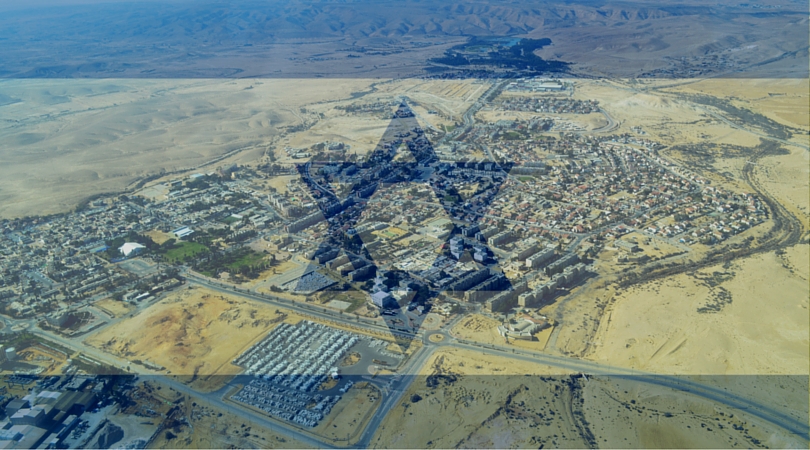“The land became contaminated and I recalled its iniquity upon it; and the land disgorged its inhabitants.” (VAYIKRA 18:25)
The Ramban expounds on this verse by teaching that HaShem (G-d) has placed angelic forces to rule over virtually the entire world. Nearly every country has a designated angel acting as an intermediary between that nation and the Kadosh Barukh Hu (G-d). In fact, only in the Land of Israel – where HaShem’s Divine Providence is direct – are there no spiritual liaisons between Him and man. As a result, the Hebrew Nation can only engage in a pure Divine service, without any foreign barriers or impurities, when situated within the borders of our country. This is how the Ramban explains the Talmud’s harsh declaration that “All who live in Eretz Yisrael resemble one who has a G-D, and all who live outside of Eretz Yisrael (Land of Israel) resemble one who has no G-D” (Ketubot 110b).
In the Diaspora, a Jew’s service to HaShem actually moves through these intermediary forces and works to increase their spiritual power, leading them to then strengthen the countries over which they preside. The Ramban’s explanation is supported by the fact that throughout the long exile of the Jewish people from our land, many of the countries in which we wandered had become great powers on the world stage. Their cultures, economies and diplomatic standings flourished while Jews were practicing mitzvot (commandments) within their borders. But often as a nation would mistreat us, however, we would be forced to relocate and the country left behind would begin its historic decline. This remarkable pattern was relatively common during the centuries of our exile.
Simply by living Torah lives in foreign lands, Jews actually strengthen the celestial powers of those nations. The Ramban teaches that Israel’s inadvertent bolstering of these intermediary spiritual forces is actually a form of idolatry, as pure Divine service can only take place within the Land of Israel. While HaShem is equally present and supreme over the entire universe, there is a distinction in our ability to connect with Him and actualize His Ideal based on our own physical location.
Every mitzvah (commandment) is like a faucet that, when opened, releases Divine blessing into our world and elevates it to a level beyond where it previously existed. These faucets, however, must be connected to the correct plumbing in order for this blessing to successfully flow through them. The Torah, which was given to Israel to be performed specifically in our homeland, is connected to the plumbing of Eretz Yisrael. A person who performs mitzvot outside the Land of Israel is essentially turning on a faucet without a pipe. No blessing flows through. The physical act was completed but not according to the Torah’s instruction. A Jew practicing mitzvot in the exile may be performing the ritual precepts but he is not enhancing Creation on any spiritual plane. There are no pipes behind his actions because the full expression of HaShem’s Torah is only realized when performed inside the Land of Israel (as nearly the entire Book of DEVARIM instructs).
HaShem divided the world between peoples and gave each one a particular territory appropriate for its specific historic role. He fashioned Am Yisrael and set us in the center of His blueprint – within the borders exclusively suited to our unique inner kedusha and national mission. Like the Nation of Israel, the Land of Israel enjoys a special relationship with HaShem. Eretz Yisrael is the point of intersection between our physical world and the Divine. Nefesh HaḤaim (4:11) explains that “G-D, Israel and the Torah are One.” HaShem manifests His greatness in our world through Divinely designated receptacles of kedusha. Just as the Torah serves as the Kadosh Barukh Hu’s written expression, the Nation of Israel is His national representation in human form. Similarly, the Almighty’s manifestation of kedusha in geographic form appears as the Land of Israel. Therefore, a Divine Providence graces Eretz Yisrael to the exclusion of all other places and it is only within our homeland that the Jewish people can truly realize the fulfillment of our national mission.
Only once HaShem’s representatives in this world are able to function according to our full potential can the ultimate expression of His Ideal be revealed. Only when the entire Hebrew Nation is situated in and sovereign over all of Eretz Yisrael – while living a national life expressing the full grandeur of Torah – can the goal of human history at long last be achieved.
It is impossible for a Jew to actualize his full potential outside his homeland, no matter how many mikvah baths, kosher restaurants oryeshivot his community boasts. Eretz Yisrael is not simply a better place to perform mitzvot but actually the only place to perform mitzvot. Rashi (quoting our Sages in his commentary to DEVARIM11:18) teaches that Jews must continue to observe Torah commandments even in the Diaspora to ensure these commandments remain familiar to us for when we eventually return home to our borders. Ramban, in his commentary to VAYIKRA 18:25, further elaborates on this concept by explaining that the Torah is meant to be observed specifically in Eretz Yisrael. The mitzvot only fulfill their true Divine function when performed within the borders of our country. And only by actualizing the Torah’s full expression can Israel bring humanity to universal redemption.

